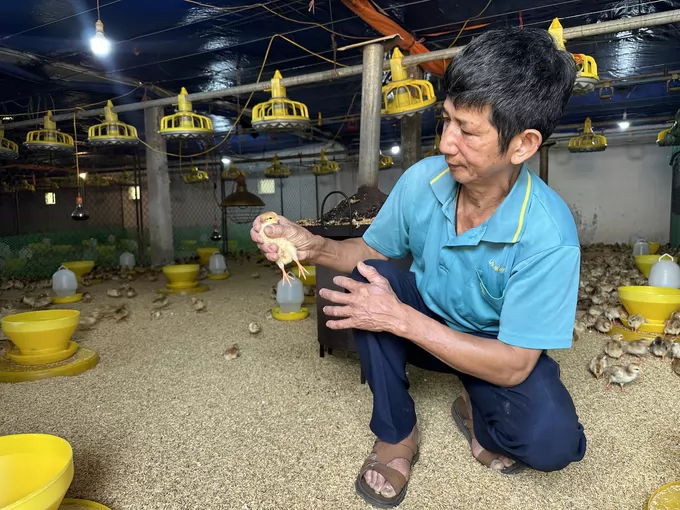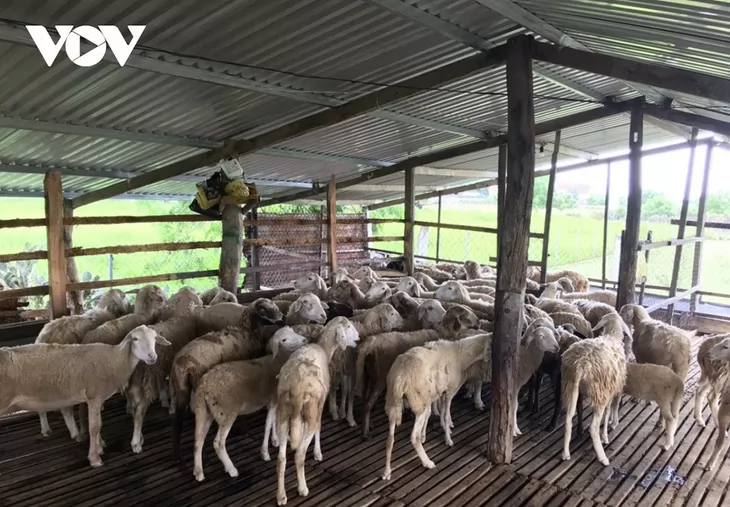Feeding chickens green tea dust limits reliance on antibiotics

Nguyen Van Phuong, owner of a chicken farm in Phan Me commune, Phu Luong district. Photo: Quang Linh.
(VAN) Aware of the danger of antibiotic resistance, Phuong applies biosecurity farming solutions. The recent batch of chickens almost did not need antibiotics.
New generation farmers with great awareness
In many places, antibiotic resistance in livestock farming remains a strange concept, often only mentioned at scientific conferences or in production plans of large-scale farms. However, in Phu Luong district, Thai Nguyen, many owners of poultry farms with a scale of 5,000 heads can fluently talk about the concept of antibiotic resistance, the risks and ways to prevent and counter this problem.
One thing to note is that these are all farmers over 60 years old, more or less facing some obstacles due to age and traditional farming practices. Nguyen Van Phuong, owner of a 5,000-chicken farm in Co 2 hamlet (Phan Me commune, Phu Luong district) is one of them.
“Antibiotics not only kill pathogenic bacteria but also beneficial bacteria, disrupting the natural balance of intestinal microflora, causing digestive disorders and possibly diarrhea in livestock. Antibiotic resistance will make the use of old antibiotics ineffective and lead to the demand for stronger substances,” Phuong said.

“To limit antibiotics, pathogens must be eliminated from the start” is Phuong's motto. Photo: Quang Linh.
Preventing disease right from the start
To minimize the risk of livestock infection and reduce the use of antibiotics, Phuong has implemented many biosecurity farming measures, such as using biological bedding, disinfecting and sterilizing barns periodically, preventing other livestock from entering the farm, and feeding chickens green tea dust. Phuong's farm is sprayed with disinfectant solutions both inside and outside the farming area, ensuring that the barn is left empty for 1.5 months in advance before stocking a new flock.
Deputy Director of Phu Luong District Agricultural Service Center Ninh Thi Thang recommends farmers spray around barns to avoid diseases from outside, including farm items and means of transport entering or leaving the barn.
“To limit the use of antibiotics, the chickens must be healthy and disease-free. Right from the start, the source of chicks must be strictly controlled. I only import chicks from reputable companies with quality commitments and absolutely do not use unidentified breeds floating on the market. I make sure to fully vaccinate them according to the regulations of the veterinary agency,” Phuong said.

Biological bedding helps chickens reduce stress. Photo: Quang Linh.
Chickens maintain healthy intestines thanks to biological bedding
Phuong used to collect waste manually and leave a strong odor on the farm, greatly affecting the surrounding environment, human health, and livestock. Through training programs on biosecurity chicken farming techniques and knowledge from the newspaper, Phuong chooses to use biological bedding for the barns.
As a mixture of rice husks and probiotics, biological bedding helps decompose animal manure, thereby reducing toxic gas emissions and odors. Operating on soft bedding instead of hard concrete also helps caged chickens reduce stress.
“Raising chickens with biological bedding helps me reduce a lot of medicine costs for chicken diseases. After cleaning the barn, the bedding also becomes a source of organic fertilizer that fruit growers usually favor. The composted manure is purchased at VND 1,500/kg, twice as high as selling fresh manure,” said Phuong.
According to this old farmer’s calculation, the revenue from selling 1.5 tons of organic fertilizer per batch of chickens helps the farm cover all the costs of buying rice husks for bedding and electricity for a month.

Green tea dust is mixed into animal feed. Photo: Quang Linh.
Letting chickens eat green tea dust
After attending the workshop on applying green tea dust to animal feed, Phuong, together with scientists and Phu Luong District Agricultural Service Center, gather knowledge and test the model of adding green tea dust to poultry feed.
When mixing 1 kg of green tea dust into 100 kg of bran, he finds that the chickens ate well, grew faster and had no disease problems. Phuong gets tea leaves from safe raw material areas and then dries them, ensuring that the chemical components in the tea leaves are not decomposed. It is later crushed to become green tea dust, which is added to the raw materials used for composting feed.

Phu Luong District Agricultural Service Center provides guidance on livestock farming techniques to local farmers. Photo: Quang Linh.
Rewarded VND 20 million for good livestock farming
Thanks to the synchronous and effective implementation of biosecurity measures, the survival rate of Phuong's chicken farm is always above 97%. Recently, the unit that signed to purchase chickens from the farm rewarded Phuong VND 20 million because of an amazing achievement. Out of 1,000 chickens sold from Phuong’s farm, only 14 were grade B, the rest were grade A.
After 90 days, the Ho chickens of Phuong's farm weigh approximately 2.8 kg, if raised to 100 days they will weigh 3 kg, usually purchased at around VND 65,000/kg. "Thanks to having clean chickens I do not have to rely on antibiotics, thus reducing disease prevention costs for chickens from VND 8,000/head to VND 4,000/chicken. The farm's profits have increased significantly," Phuong said.
Author: Quang Linh
Translated by Samuel Pham
Maybe you are interested

Viet Nam's livestock sector makes breakthroughs in breed selection and development
Alongside building a National Livestock Gene Bank, the livestock sector aims to refine policies and promote high-tech, large-scale breeding enterprises.

Farmers in Ninh Thuan province get rich by sheep farming
Ninh Thuan province is known as a hub of sheep raising in Vietnam, and Xuan Hai commune is the biggest sheep raising area in the province.

Soc Trang's shrimp farming area to remain unchanged in 2021
The Mekong Delta province of Soc Trang plans to breed brackish water shrimp species in more than 51,000ha of ponds next year, the same as this year.





